#jean-pierre martinet
Explore tagged Tumblr posts
Text







V/A
"Carnet de Notes #31"
(7"EP. Heugel. 1970) [FR]
youtube
#compilation#1970#france#contemporary#7“s#betsy jolas#jean louis martinet#pierre boulez#gilbert amy#records#Youtube
0 notes
Text
I had the hardest time getting to sleep last night, I was rolling around in bed til half past midnight. Ended up reading Jean-Pierre Martinet’s With their hearts in their boots, an 80 page noirish novella, reminded me a lot of david goodis but obsessed with film (perfect). Also spent some time looking into the FIAF summer school certification in film restoration in Bologna, though it’s an insanely competitive field and I’d mostly be doing it to spend a summer in Italy…. We’ll see what ends up happening
3 notes
·
View notes
Photo

« Il n’y a pas de drame, chez nous, messieurs, ni de tragédie. Il n’y a que du burlesque et de l’obscénité. On n’est pas heureux, mais on se marre bien. Jaune, bien sûr, mais enfin. Et puis avouons-le, le malheur fait rire » dit-il, dans un accès de vérité. La grande vie est-elle monstrueuse, farceuse, dérisoire ou superbement outrageante ? Elle est surtout l’œuvre d’un écrivain majeur qui fut, ne l’oublions jamais, l’artisan de la redécouverte de Calet. Tout est dit.
La grande vie de Jean-Pierre Martinet – L’Arbre Vengeur
(via La grande vie pour cinq euros - Causeur)
0 notes
Text
Je nommais un à un ses amants, et je les faisais disparaître dans la nuit. Je les rendais au néant d'où ils n'auraient jamais dû sortir. Je les écrasais entre mes doigts comme des punaises. En crevant, ils laissaient derrière eux une odeur fade. Mais il en sortait de partout. Ce grouillement me donnait envie de hurler. Le ciel lui-même s'obscurcissait de cette vermine. Noudamigue, Novonisse, Orsagage, Outandre, Ovoux, Patrude, Pringe. Misère. Il n'y avait rien à faire pour apaiser ma souffrance. Ces fantômes étaient les plus forts. Rag, Roumigne, Rovaindre-Dubail, Sansinot, Saudre, Saveigne, Saxaline. Je suffoquais. Ce n'étaient pas des ennemis dignes de moi. Tous les moyens leur étaient bons pour m'humilier. L'immense armée des amants de Polly grandissait sans cesse, elle enflait comme une mer, elle me recouvrait lentement, et quand je me croyais enfin, ô délivrance, définitivement submergé, il en venait encore, de tous les coins du monde, les nuages crevaient, les pierres disjointes se soulevaient, les murs suintaient, des hommes, des femmes, des gamins, des fillettes, des vieillards lubriques, des lesbiennes au masque de squelette, des chiens bandant désespérément dans l'espoir d'avoir enfin accès à cette région fabuleuse dont on leur avait tant parlé, des taureaux, des étalons, des gorilles genre King-Kong, des limaces un peu trop curieuses, des mille-pattes partis de chez eux depuis des années dans l'espoir insensé de s'introduire enfin entre les cuisses de Polly, des nougris, bien sûr, et des encervas, cela va de soi, mais aussi, hélas, des nanduzes, des farlinopes, des estarames, des mornegrulles, et là, je le sentais bien, il n'y avait plus rien à faire, les mots eux-mêmes copulaient entre eux, ils me narguaient en formant des accouplements monstrueux, j'avais beau me boucher les oreilles, j'entendais ces sales bestioles ruger, s'entourler sornieusement dans la dronge, et là, se mettre à griner, fruisser, charnoter, lépioter, impunément, oui, c'était vraiment intolérable, j'étais le seul à n'avoir pas le moindre droit sur Paulina Semilionova, mon amour faisait de moi un pestiféré dont on s'écartait avec dégoût.
Jean-Pierre Martinet / Jérôme / éd. Finitude / [1978] 2008.
6 notes
·
View notes
Text
Nouvelles acquisitions (Octobre 2018) Rattrapage
Vendredi 05.10.18 Café-librairie Michèle Firk, 9 Rue François Debergue, 93100 Montreuil Fernand Combet - SchrummSchrumm ou l'excursion dominicale aux sables mouvants

Livre singulier, très original, un peu décevant aussi. J'ai découvert ce livre grâce à la lecture qu'en fit Denis Lavant ici : https://bit.ly/3eC1jAW Lavant raconte sa rencontre avec ce livre, c'est Éric Dussert, dénicheur infatigable de chefs d'œuvres méconnues, qui l'arrête un jour dans la rue et qui, dans la conversation, lui vente les mérites de ce livre. Contre toute attente, Lavant l'ouvre rapidement et se trouve pris dans les filets du mystérieux Fernand Combet. J'ai entendu un entretien de Jean-Paul Cisife (Comédien et adaptateur) datant de 1971. C'est Jean-Claude Grumberg (l'auteur de théâtre) qui, le premier, trouve le livre de Combet sur le quais. Il le prête à Sisyphe qui, bien qu’un peu déprimé par certains passages, l'adapte pour la radio.
Combet est l'auteur de trois livres. SchrummSchrumm ou l'excursion dominicale aux sables mouvants, 1966 ; Factice ou les hommes-oiseaux, 1968 ; Mort et passion de Félix C. Scribator, 1971. Tous trois parus chez Pauvert. Plus tard, l'éditeur affirmera que SchrummSchrumm est un des meilleurs livres qu'il ait édité. Un chef d'œuvre alors ? Oui et non. D’abord, ça parle de quoi ? SchrummSchrumm est un excursionniste de première classe. (On ne sait jamais à quoi correspond exactement cette profession, « une vocation » précise SchrummSchrumm, on n'en saura pas plus.) Un jour, un car vient le chercher en bas de chez lui pour l'emmener en excursion… aux sables mouvants. Pourtant, SchrummSchrumm ne se souvient pas d'en avoir fait la demande. Peu importe. On l'emmène, presque de force. Dans le car, les voyageurs sont attachés, les yeux bandés. On les moleste, on leur parle mal. Ce n'est que le début d'un récit absurde, ritualisé et angoissant, dans lequel SchrummSchrumm attendra longtemps les réponses à ses questions. Stagnant dans une citadelle étrange appelée Malentendu, cernée de miradors, aux portes des sables mouvant, il sera confronté à des personnages aberrants, ambigus, cauchemardesques, qui ne semblent mis sur son chemin que pour mieux le perdre. Il en vient à souhaiter le plus vite possible, et nous aussi, le départ pour les sables mouvants, qui tarde à venir. Qui est le Saint directeur de Malentendu ? Que fait-il là, lui, SchrummSchrumm ? Qu’est-ce qui l’attend une fois passée l’épreuve des sables mouvants ? Sera-t-il plus malin, plus habile que ses prédécesseurs à en déjouer les pièges ?
Malgré l'originalité de ce roman, qui reste, il faut le dire, longtemps en tête, quelques bémols… Dès le départ, on sent quand même venir la fin, et on n'a, hélas, pas de surprise de ce côté-là. Le récit, vers le milieu, tourne un peu en rond et il faut à ce moment se forcer pour continuer la lecture. L'histoire prend alors une direction inattendue et finit somme tout assez vite, de façon abrupte. Ceci dit, le monde décrit par Combet, irrationnel au possible quoique crédible, est assez marquant et des scènes vous restent durablement en tête, comme la mort des petits obèses nus, qui se dégonflent en lâchant un : « aaah, nous avons bien aimé la vie ! » On est forcé en lisant Combet de penser à Kafka. Jean-Paul Cisife, lui, y voit surtout une influence de Michaud, ce qui n’est pas faux. Combet, de son côté, parlait d'un roman d'adolescence. Il est vrai que malgré une originalité et une folie évidentes, ce roman vous laisse sur un sentiment mitigé. Il faut pourtant le lire, si on aime les récits absurdes et les univers décalés, on n’en trouve pas des dizaines qui ont le pouvoir de vous rester en tête. Malgré son côté glauque et déprimant, c'est un livre qu'on a envie de refiler ; sous le manteau, certes, mais j'allais dire comme une sorte d'ivresse, pas désagréable, car elle tourne un peu la tête, mais dont on n’est pas mécontent de se débarrasser et de voir quel effet elle aura chez les autres. Comme le firent, pour des raisons diverses, Grumberg avec Cisife et Dussert avec Lavant... Cisife et Lavant ont fait leur travail de passeurs. Je m’y colle, car c’est le genre de livre qui ne peut laisser indifférent.
Samedi 06.10.18 Gilda, 36 rue Bourdonnais Michel Onfray - Le deuil de la mélancolie

Je l'avais pourtant écouté raconter ici ou là le récit de son second AVC, égrener les erreurs de diagnostiques qu'il a rencontré... Cela aurait pu me suffire. Il y a pourtant une plus-value à la lecture de ce livre. C'est la même à chaque fois, d'ailleurs : la force de l'écriture. S'il sort de cette épreuve diminué, champ de vision altéré, problèmes de spacialisation... son écriture demeure intacte.
Il y a en outre un passage bouleversant au coeur du livre : l'oraison funèbre écrite à la mort de sa compagne, et qu'il n'a pas eu la force lire sur le moment. Lecteur de longue date d'Onfray (1990, avec Cynismes) j'avais entendu parler de Marie-Claude, ici où là, depuis Fééries Anatomiques. Elle n'était souvent qu'une silhouette, qu'un prénom. On découvre soudain toute une vie, et on est pris à la gorge à la description des choses qu'elle aimait et qui lui survivent, comme dit Onfray, sous la forme d'une belle anaphore. Les chats, les chevaux, les arbres, les jardins, ses élèves, certains endroits de sa ville. Avec des phrases d'une simplicité brute comme : « seuls les morts n'ont plus à mourir et sont fait d'une étoffe de mémoire. » Ou encore, comme un écho au très beau Requiem Athée : « Je te survivrai un temps, mais l'éternité du néant nous réunira. »
On sort aussi du livre avec l'envie de lire, ou de relire Marc Aurèle (qui sans doute apparaîtra tout entier dans Sagesse ?), auteur que pour ma part j'avais survolé lors de ma lecture de Cioran vers 1992. Pour des phrases de ce genre :
« Que la force me soit donnée de supporter ce qui ne peut être changé et le courage de changer ce qui peut l'être, mais aussi la sagesse de distinguer l'un et l'autre. »
Ce livre rappelle à tous les pédants qui dénient à Onfray le titre de philosophe, 1) que la philosophie est au centre de tout ce qu'il écrit et 2) que la philosophie doit être avant tout utile, sinon elle ne vaut rien. Pour certains, les mêmes pédants, un auteur qui nous transmet cela n'est pas un philosophe. Il l'est pour moi. Il est même plus, il est important.
Jean-Pierre Martinet - La grande vie

Encore un texte qui a été lu (sur scène) par Denis Lavant et édité par Éric Dussert à l’Arbre vengeur. La grande vie est un court récit, euh... dérangeant. Un personnage un peu falot, fossoyeur de son état, qui habite, évidemment, en face d'un cimetierre, vit une histoire d'amour sordide avec sa concierge, personnage ideux et déluré. Pour les amateurs de noiceur et de vies tragiques sans issue, ce livre est pour vous !
« Je pensais souvent à ce cinéaste japonais, Ozu, qui avait fait graver ces simples mots sur sa tombe « Néant ». Moi aussi je me promenais avec une telle épitaphe, mais de mon vivant. »
Tout est dit, ou presque. Texte sombre voire sordide, certes, mais intense. Et drôle. L'humour, comme on s'en doute, est aussi noir que le reste.
« A vrai dire, je ne désirais pas grand-chose. Ma règle de conduite était simple : vivre le moins possible pour souffrir le moins possible. »
Martinet est l'auteur d’un roman culte, Jérôme, autre livre que je ne m'interdirai pas de lire à l'avenir.
Gibert Jeune - Nouvelle Braderie, place St Michel Umberto Eco - Comment voyager avec un saumon James Thurber - Ma chienne de vie
Boulinier HISTORIA SPECIAL N°477 - La commune de Paris - 1871, Les 72 jours de l'insurrection Gaston Leroux - Hardigras ou le fils de 3 pères
Dimanche 07.10.18 Boulinier Jean-Pierre Andrevon - Les revenants de l'ombre HISTORIA N°471 - Mars 1986 - Hetzel éditeur, Le trésor de Charette, Tuer Heydrich, L'année 1936 Henri Michaux - Plume, précédé de Lointain intérieur Jean-Pierre Martin - L'autre vie d'Orwell Shirley Jackson - La loterie Huysmans - En rade, Un dilemme, Croquis parisiens
Samedi 13.10.18 Gilda, 36 rue Bourdonnais Michel Onfray - La Cavalière de Pégase - Dernière leçon de Démocrite

Lu et apprécié ce nouveau recueil de haïkus, inattendus de la part de l'auteur. Je garde une petite préférence pour le recueil Un Requiem athée.
Boulinier Jacques Pessis - Pierre Dac, mon maître soixante-trois, théâtre Graham Greene - Un américain bien tranquille - Notre agent à la Havane - Le facteur humain (Coll. Bouquins) John Steinbeck - La grande vallée, nouvelles
Gibert Jeune - Nouvelle Braderie, place St Michel Europe n°853 - Mai 2000 - Ramuz, Iossif Brodski, Ecrivains d'Acadie Albert Camus - Caligula, suivi de Le Malentendu
Sur les quais Henri Pichette - Les Epiphanies (Coll. Poésie Gallimard) Jean Follain - Exister, suivi de Territoires (Coll. Poésie Gallimard)
Samedi 20.10.18 Librairie Le Dilettante (7, place de l'Odéon) Luke Rhinehart - Invasion Raymond Cousse - Le bâton de la maréchale, roman militaire et pornographique Henry Miller - Peindre c'est aimer à nouveau, suivi de Le sourire au pied de l'échelle Isaac Bashevis Singer - Yentl et autres nouvelles
Librairie Rieffel (15, rue l’Odéon, Paris) Michel Onfray - La cour des miracles, carnets de campagne 2
Boulinier José Corti - Souvenirs désordonnés
Vendredi 26.10.18 Via internets Isaac Bashevis Singer - Une sorte d'autobiographie spirituelle - T1. Un jeune homme à la recherche de l'amour
Samedi 27.10.18 Boulinier Ivan Bounine - Elle Remy de Gourmont - Histoires magiques et autres récits
Gibert Jeune - Nouvelle Braderie, place St Michel Neeli Cherkovski - La vie de Charles Bukowski Serge Valletti - Pourquoi j'ai jeté ma grand-mère dans le Vieux-Port Saul Bellow - L'hiver du doyen Christopher Isherwood - Le mémorial, portrait d'une famille René Depestre - Eros dans un train chinois Juan Carlos Onetti - Les bas-fonds du rêve
Mercredi 31.10.18 Via internet Gérard Guégan - Ascendant Sagittaire - Une histoire subjective des années soixante-dix

J'ai commencé par piocher dans ce livre en ciblant les auteurs qui m'intéressaient : Charles Bukowski, Ken Kesey, Jean-Jacques Abrahams (L’auteur de L'homme au magnétophone, qui mis à mal la psychanalyse, avant le Livre Noir et avant celui d’Onfray), Jean-Pierre Martinet, dont je parle plus haut et sur qui on apprend quelques éléments biographiques. Guégan, viré de Champ Libre, qui relança les éditions Sagitaire (grand éditeur surréaliste), de 1975 à 1979, date de disparition de la maison, est un personnage souvent arrogant, aux postures très post soixante-huitarde, toujours un peu dans l’excès, la provoc’. Et sa proximité avec Raphaël Sorin, que je trouve tout aussi antipathique, malgré son admiration pour Louise Brooks, fait que j’ai souvent reposé le livre avec un soupir agacé. Mais j'aime les livres qui parlent de livres, alors parfois j’y replonge. Tenir l'homme à distance ne sous-entend pas qu'il n'ait pas un avis sûr en matière de livres, qu'on puisse partager.
Anecdote encourageante pour les traducteurs en herbe : Quand Guégan a commencé à traduire son premier Bukowski, les poèmes de L’amour est chien de l’enfer, il n'avait que de faibles bases en anglais et un mini dictionnaire bilingue de la collection Poucet. Il a fait des progrès ensuite, vu le nombre de ses traductions. Ceci dit, dans Bukowski, je préfère quand même celles de Philippe Garnier.
0 notes
Photo

2 notes
·
View notes
Photo


Jean-Pierre Martinet (1944-1993)
http://www.lmda.net/din/tit_lmda.php?Id=59972
2 notes
·
View notes
Quote
Je suis un type tellement profond que lorsque je regarde en moi, j’ai le vertige, et je dois me cramponner pour ne pas tomber.
1 note
·
View note
Text
#1007 Jean-Jacques Perrey - Moog Indigo
#1007 Jean-Jacques Perrey – Moog Indigo
Jean-Jacques Perrey was a key figure in the popularisation of electronic music during the 1960s to 70s. Though rather than the avant-garde sounds of his countrymen Pierre Schaeffer and Pierre Henry, his work, particularly in collaboration with Gershon Kingsley focused, on the lighter side of musical entertainment. From the early 1950s he became somewhat obsessed with the Ondioline, an early…

View On WordPress
#Angelo Badalamenti#Charles Trenet#David Lynch#Electronica#French#Gershon Kingsley#Jean-Jacques Perrey#kitsch#lounge#Moog#Ondes Martinet#Ondioline#Pierre Henry#Pierre Schaeffer#samples#space rock
0 notes
Text
Ney’s Execution; Victor’s Remorse
If, in the year of 1815, all eyes are turned to Luxembourg, it is not to admire the Haute Chambre itself, but because a resounding event took place there: Ney first appeared before a council of war that declared itself incompetent; according to his own wishes, he is brought before the Chamber of Peers constituting a Court of Justice. A climate of revenge permeates royalist circles, excepting the King, a fine politician, who would have done without a lynching. His entourage, however, burns to make an example, a sort of expiatory sacrifice. On 4 December [1815], the Peers meet and debate for two days. The result is without appeal: one single Peer, the duke of Broglie, speaks with courage against the condemnation; five abstain; seventeen vote for deportation; a hundred and thirty eight vote for death. They considered themselves judges rather than jurors; they thus enforced the law. Victor voted with the majority, undoubtedly with a heavy heart; in any case in each of the two ballots, he voted for the death of his former companion-in-arms, as did Maison, former chief of staff of Victor and Ney’s companion-in-suffering in Russia. The King will not use his right of pardon and Ney will be shot on 7 December. It seems that Victor, throughout his life, will suffer from remorse of this decision [...]
Jean-Pierre Tarin, Le Maréchal Victor: loyal sous Napoléon, fidèle sous la Restauration, p. 280.
It is common knowledge in Napoleonic circles that Victor voted for Ney’s death, and the circulated claim that Victor regretted his choice for the rest of his life intrigued me as soon as I saw it. From where was it sourced and how valid was the source? The Tarin biography of Victor skims over Victor’s reaction to Ney’s fate (more emphasis was given to figures of the Restoration in the succeeding passages—men, money, dates). Worse, the account Tarin gives of the trial and execution does not seem to be sourced, as if a memory-based anecdote. Evidently, from Tarin’s perspective, Victor’s alleged “remorse” is unimportant to his life. I am sure many reading this would agree with Tarin—it would be more telling to act as one believes in the moment than to cry over spilt milk. Indeed, acting in the moment is what the Marshals are known for, and it's why We Don't Talk About Victor Marshals that fit the archetype are more likeable.
The Le Coustumier biography is sympathetic to Victor. It circulates the same claim with more detail, and fortunately, the source is mentioned (p. 284).
If we are to believe Count André Martinet in an article published in Janurary 1902 in Le Figaro, (as Martinet could consult the Bellune family archives and speak with [Victor’s] descendants,) the death of Ney tormented Victor’s conscience through his remaining life. He reports: “But there was a day in the year where the Duke of Bellune did not appear at the family table, where he refused to receive even the most intimate of his friends: 7 December, which witnessed Ney's execution.* (…) Why, he often said, did my poor comrade refuse to appear before a council of war composed of the Marshals of France? If we were obliged to pronounce a condemnation, rather than executing the sentence, we would all have returned our batons to the hands of the King, and he would have been compelled to give pardon.” * The death of Ney pursued Victor to his grave. It was the 7 and 8 March 1841 that the eldest son of the Prince of Moscow made his entrance after ten years of waiting into the Chamber of Peers, demanding in vain the rehabilitation of his father. On both days, Victor was resting at Saint Louis des Invalides, to be buried on 9 March at Père Lachaise.
A note on the footnotes: Victor had died on 1 March 1841, so Le Coustumier may be stretching the metaphor a little. It might be more logical to say that Marshal Ney was left unrecognised until more favourable hands seized political power. The italics are my emphasis, for clarity. pp. 280-281 of the Le Coustumier quotes Augereau (unsourced!) on a similar note.
Weakened by his remorse, Augereau confessed on his deathbed, seven months later: “We were cowards. We should have declared ourselves competent despite Ney’s objections. If we had done so, he would at least have lived."
Augereau's words are believable enough. Do we buy Victor’s “remorse”?
The source from which the claim is taken from should not be disregarded entirely—Le Figaro is still recognised as an authoritative and independent newspaper—but it does have conservative tendencies, and has largely catered to a middle, if not the upper-middle class. To put it in context, the author of the article was a count, writing about a former government official with a similar status to himself, and conducted interviews with said official’s descendants. As a result of the individuals involved and the demographic the newspaper caters to (one similar to the featured individual), the writer would be more likely to portray Victor in a positive light. If remorse does not exonerate Victor, it softens his cruelties and paints his decision as a one-off mistake instead of condemning his character flaws. Is repenting for twenty-six years not absolution enough? Is it not karmic enough that Ney’s death occurred on Victor’s birthday, permanently blackening a date supposed to be his? (Never mind that perhaps he celebrated his name day or baptism day instead of his birthday, or that one day of mourning each year is a small price to pay for a dead man.) But if, as humans, we want to believe in the inherent goodness in Victor, we must also consider the claim's side affect of apotheosising the man. This is, after all, a family account featured in a sympathetic newspaper.
If there were other sources to crosscheck this, we could verify Victor’s sentiments (and if they are true, calling your annual day to wither away in a room “remorse” may be underselling how much you regret your life choices). The problem is that I cannot find other sources. It would be gratifying to believe Victor’s grief was real, because he was only human, but it is dubious at best. One can only hope that, in some timeline, if not in this one, he did pay emotional penance. Ultimately, I think that if a claim is made, it will be remembered if it is a good story.
#michel ney#claude victor-perrin#le maréchal victor: loyal sous napoléon fidèle sous le restauration (2006)#le maréchal victor (2004)#this is late but maybe it is better that way#we don't talk about victor but maybe for good reason#the next bits of the biographies will probably be in chronological order
45 notes
·
View notes
Text
La Grande Illusion: the collapse of the old order of European civilisation
Jean Renoir’s monumental 1937 cinematic masterpiece La Grand Illusion has always been a favourite of mine ever since my grandfather - a highly decorated military veteran himself - first brought the classic war film to my attention over a family Christmas.
It’s easy to gush about Renoir’s World War One classic. It won at the Venice Film Festival upon release and was the first foreign language film to be nominated for an Oscar - despite the novelty of seeing and hearing the British, French and German officers speaking their own native tongues. The critical reception and accolades aside, La Grand Illusion is simply an extraordinarily well-made film that makes a serious commentary on the condition of Europe and examines common values and decency under the stress of war - the ability in all of us to act with respect and warmth towards those with whom we share bonds stronger and deeper than national boundaries and political divisions.
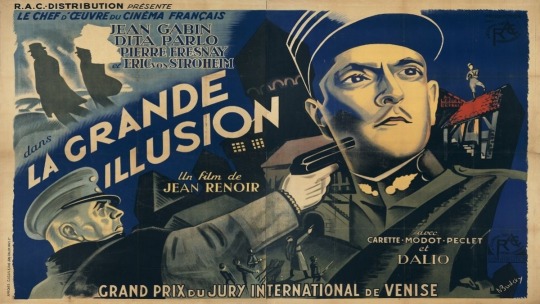
The “grand illusion” of Jean Renoir’s great French film referred originally to the British author Norman Angell’s belief that the supposed financial advantage of war is a falsehood. For Renoir - himself a veteran of the World War One trenches - this illusion evolves into something more complex and various, and so does its tragic and ironic grandeur.
There are only two references to the title but both are pertinent. Once when a French soldier exclaims ‘what an illusion,’ when a comrade says that the war will be over before they have time to escape from military prison, and again when he describes the end of all wars as an illusion.
The legendary Eric Von Stroheim is Captain Von Rauffenstein, an aristocrat and German PoW camp commander in the first world war, ramrod-straight in a uniform with white gloves that conceal horrendous burns from when he was shot down in combat. He pursues an elaborately civilised policy of martial respect for his distinguished prisoner Captain de Boeldieu (Pierre Fresnay) - a suave French aristocrat in his own right. But Rauffenstein is archly disdainful of Boeldieu’s more plebeian comrades Rosenthal (Marcel Dalio) and the boisterous working class Maréchal, played with luminous masculinity by Jean Gabin.
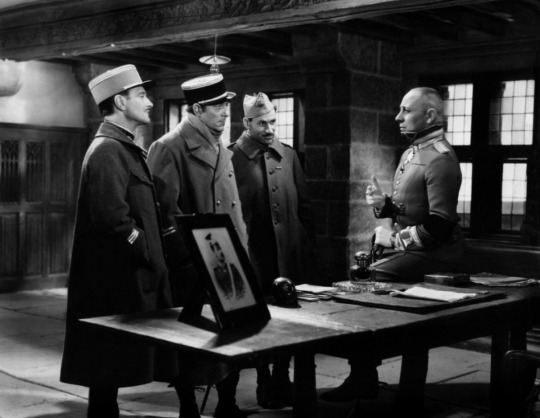
What the Frenchman knows and the German won’t admit is that the new world belongs to commoners. It changed hands when the gentlemen of Europe declared war. And the “grand illusion” of Renoir’s title is the notion that the upper classes somehow stand above war. The German cannot believe that his prisoners, whom he treats almost as guests, would try to escape. After all, they have given their word not to.
"Neither you nor I can stop the march of time,” the captured French aristocrat Capt. de Boieldieu tells the German prison camp commandant, Von Rauffenstein. A little later, distracting the guards during an escape of others from the high-security German fortress, the Frenchman forces the German to shoot him, reluctantly, and they have a final deathbed exchange. `” didn’t know a bullet in the stomach hurt so much,” he tells the German. “I aimed at your legs,” says the German, near tears. And a little later he says: "For a commoner, dying in a war is a tragedy. But for you and I - it’s a good way out.”
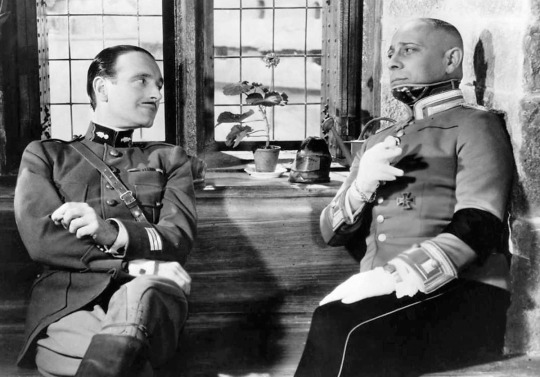
For me one the things that hit me is how much the film underlies the separation of classes, which is the second major concern of the film. Indeed, the characters provide a microcosm of the European class system in the early twentieth century. It is interesting to note that not everyone in the film is limited by the barriers of his mother tongue. The two aristocratic officers, von Rauffenstein and de Boeldieu, as well as the scholar, Demolder, can speak or understand several languages other than their own. The Jewish officer, Rosenthal, who has relatives on both sides of the front, can speak German. With the possible exception of Rosenthal, however, the linguistic skills of these characters are ineffectual instruments of human understanding. The reasons are various and have mostly to do with class.
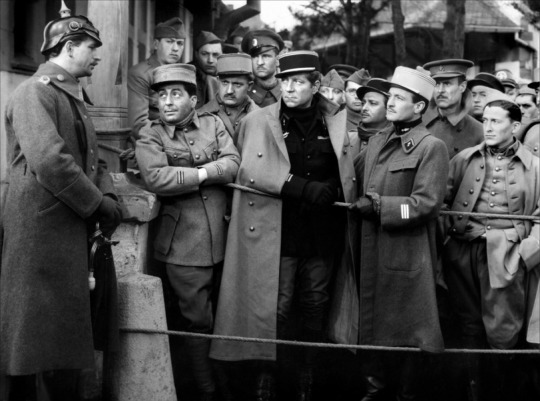
Demolder, the Greek professor, is the object of much ridicule. To the aristocrats he is never more than a subject of minor amusement. They ignore him, for instance, when he gawks like an undergraduate art history student at the Medieval fortress of Wintersborn, where they are being held prisoner. Even the middle class Marechal parodies him at one point, exclaiming that the castle is ``Fourteenth century,” to which Boeldieu replies wittily, “Pure Gothic.” Ironically, the scene was actually shot in a chateau built by Wilhelm II.
Demolder’s books, in which no one else is the least bit interested, disturb Boeldieu’s cards. Boeldieu remarks “coldly” that Demolder’s dictionaries are going to be in his way. Demolder is in the process of translating Pindar, whom he considers “the greatest of the Greek poets.” We are left in no doubt, however, that the undertaking will not be as momentous as Demolder would like to think. Rauffenstein’s contemptuous comment upon learning of Demolder’s activity is: “Poor old Pindar!”
Boeldieu says that Demolder has “the soul of a bird.” Although Demolder has a sentimental worship of books (he is incensed when the Russians set their books on fire) and studies a foreign language, his interests are ineffectual. The student of a “dead language,” he offers no help in bridging the language barrier between the French and Germans.
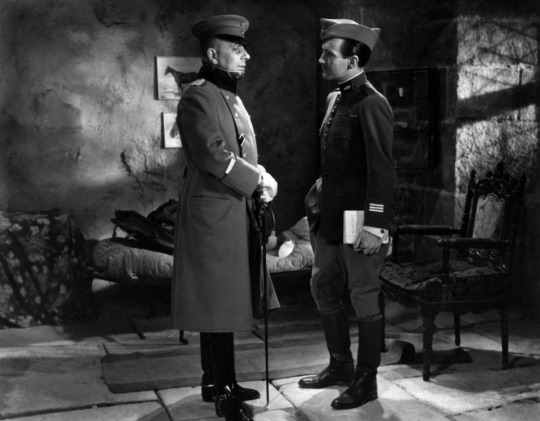
The aristocrats, Boeldieu and Rauffenstein, might effect such a bridge between the nationalities, but they are prevented from doing so by the duties and isolation of their class. They are separated from their fellow officers as much as anything by language.
Boeldieu, for instance, is isolated by a certain class dialect as well as what one might call his ideolect. Throughout the film, he speaks in a witty, formal, epigrammatic style typical of the aristocracy. At Hallbach, noticing the young German soldiers drilling while the prisoners of war prepare their play, he comments: “On one side, children playing at soldiers. On the other, soldiers playing at children.” The conversation at Wintersborn is distinguished by his witty banter with Rauffenstein. When the latter has finished showing his new prisoners around the fortress, Boeldieu remarks: “It was very pleasant of you, sir, to have shown us around your estate.” The other French officers cannot or are not allowed thus to “pull off” their attempts at wit. Marechal’s amusing joke about Maxim’s does not go over with Rauffenstein.
Boeldieu’s formal style leaves his fellows cool to him and indeed suspicious of his motives. Marechal himself, who must “explain” Boeldieu to the others, notes at one point that “he’s a good bloke, but you can’t let yourself go with him, you can’t feel free…. A different sort of education…. If ever you [Rosenthal] and I found ourselves in a bad spot, we’d just be a couple of poor down-and-outs, but him, he’d always be Monsieur de Boeldieu.”
Later in the film, when the bourgeois Marechal, aware of Boeldieu’s impending sacrifice, attempts a deeper level of friendliness, Boeldieu puts him off: “I’m not doing anything for you personally. That excuses us from the danger of getting emotional.” When Marechal questions Boeldieu’s continued use of the formal “vous” after eighteen months together, Boeldieu responds: “I say vous to my mother and my wife.”
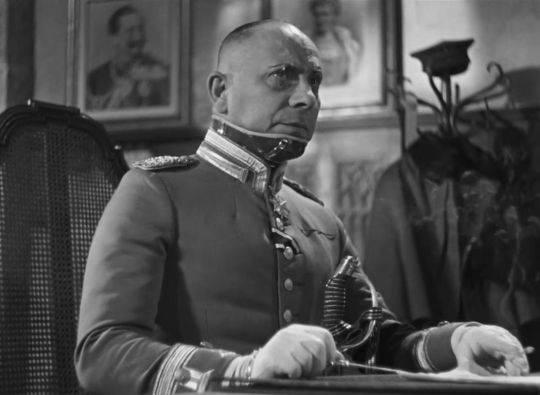
Rauffenstein is similarly isolated from his fellow officers by class and language. His preferred languages seem to be French and English, and when he does speak German his voice takes on an unaccustomed and alien rasp. His junior officers are also of the middle class, and they consider him something of a lunatic for what is to them eccentric behavior. Rauffenstein’s careful cultivation of the geranium, “the only flower in the castle,” is ridiculed by his martinet of a junior officer, a former headmaster who claims to “know how to keep that gang of devils [the prisoners] in their place.” Interestingly, in the moving scene of Boeldieu’s death, Rauffenstein sacrifices this last “flower of the aristocracy.”
Boeldieu and Rauffenstein, isolated from their fellow officers, have the most in common with each other, but ultimately they are separated by something else they have in common: their patriotic duties as aristocratic career officers. Rauffenstein seems to regret this more than Boeldieu and is keener to maintain their priviledged intimacy. To effect this intimacy he makes continual use of the English language.
A language common to the aristocracy of Europe, English allows Rauffenstein to distinguish himself and Boeldieu from the others, in effect to talk over their heads. It becomes their special language. In the early banquet scene, Rauffenstein, recognizing Boeldieu’s name, presumes his knowledge of English. Sesonske has pointed out that “Rauffenstein switches from French to English without question or explanation, knowing that a `de Boeldieu’ will of course understand,” whereas “Marechal is surprised to find his German neighbor speaking French and seeks an explanation.”
In a later scene at Wintersborn, Rauffenstein shows off his twenty-five Maxim machine-guns to Boeldieu and the others. Marechal attempts to imitate Boeldieu’s witty style: “Why, of course, sir. Personally, I prefer the restaurant…” The response of the two aristocrats to this infringement on their stylistic territory is interesting. Boeldieu, at whose expense the joke is made, accepts it with a benign resignation, as a master does a pupil’s imitations: “Touché.”
Rauffenstein, on the other hand, will not condescend to the humor of an inferior. He shifts immediately to English, talking as he knows over the heads of the others: “I used to know a pretty girl at Maxim’s… back in 1913. Her name was Fifi.” Boeldieu responds also in English: “So did I.”
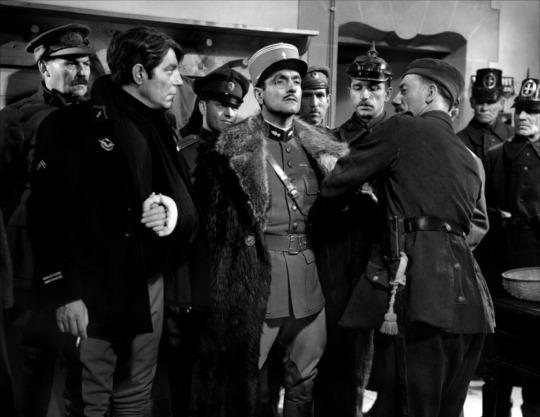
Rauffenstein’s aristocratic snub recalls, as he likes to do, a nostalgic time before the war when aristocratic career officers did not have to accept middle class “officers” such as Marechal and Rosenthal as in any sense their equals.
Both Rauffenstein and Boeldieu know, however, that the old European aristocrats, along with the peculiar form of international understanding they possessed, are a dying breed, cut off from their own lower classes and no longer in control of events. In a private conversation in Rauffenstein’s quarters, again punctuated with English phrases, they discuss this situation candidly.
Rauffenstein admits his distaste for his present position as commandant. “I was a fighting man and, now, I am a bureaucrat, a policeman. It is the only way left for me to try and serve my country.” When Boeldieu asks him why he made an exception in inviting him to his quarters, Rauffenstein responds disdainfully: “You call Marechal and Rosenthal… officers?” Whatever else the war brings, “it will be the end of the Rauffensteins and the Boeldieus.”
To Rauffenstein, such middle class soldiers are “the charming legacy of the French Revolution.” Boeldieu comments that “perhaps there is no more need for us.” Rauffenstein immediately asks: “And don’t you find that is a pity?” Boeldieu responds, less certainly: “Perhaps.” Boeldieu’s scepticism suggests that if there is to be a solution to the problem of lack of international understanding, it will not come from an international aristocracy with an exclusive language.
Indeed, this point is dramatised in the final exchange of English between the two men. When Boeldieu devises a plan of escape for Marechal and Rosenthal, he reserves for himself the role of creating a diversion. While all the prisoners except Marechal and Rosenthal assemble for a general roll call, Boeldieu climbs the watch-tower and plays the tune, “Petit Navire,” on a flute (an instrument he claimed earlier to have hated). He distracts the Germans long enough for his middle class comrades to effect their escape. When Rauffenstein learns of Boeldieu’s dangerous escapade, he makes a final personal appeal to Boeldieu to surrender. Interestingly, the appeal is in English, unintelligible to his own men and the various prisoners.
Rauffenstein in English: Boeldieu, have you really gone insane? Boeldieu in English: I’m perfectly sane. Rauffenstein in English: Boeldieu, you understand that if you do not obey at once and come down, I shall have to shoot…. I dread to do that. I beg you… man to man, come back. Boeldieu in English: It’s damn nice of you, Rauffenstein, but it’s impossible.
At this point, Rauffenstein is forced to shoot Boeldieu, and only afterward learns that Marechal and Rosenthal have escaped. To himself in English (in a language he can now use only with himself) he mutters, “so that is why,” and suddenly shifting to a harsh German, orders the dogs called out to search for the escapees. In the end, the mutual intelligibility of the aristocrats is overcome by their intense sense of divergent duties. As Boeldieu comments on his deathbed when Rauffenstein begs his forgiveness, “I would have done the same thing. French or German… duty is duty.” However moving the scenes with the two aristocrats may be, thay cannot offer a solution to the problem of human understanding that the film poses. They represent rather a dead end.
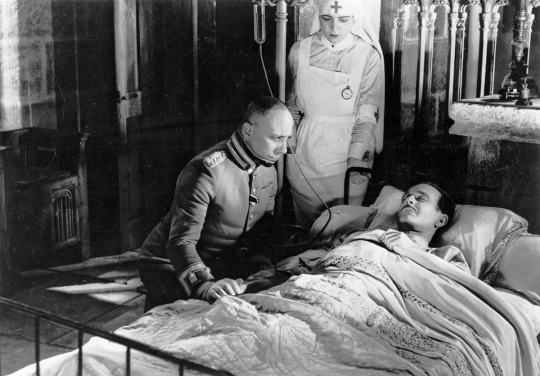
If there is to be such a solution, Renoir seems to tell us, it must come from the middle class, from the Marechals and Rosenthals and Elsas of Europe. Accordingly, these characters dominate the film’s final scenes.
La Grand Illusion’s most basic contributions to cinema include a series of well-followed tropes used in later prison escape films. Hiding their escape hole under floorboards beneath a bunk, the men tie a rope to a single mole digging the passage deeper. Air flows to him through a tube of cans, and a string attaches to a warning tin that he pulls to sound his readiness for relief. The excess earth is stored in small bags and emptied from under their pants during their faux gardening activities. Later escape-centric films such as Frank Darabont’s The Shawshank Redemption (1994), John Sturges’ The Great Escape (1963), and Le Trou (1960) by Jacques Becker (himself the assistant director on Grand Illusion) replicate aspects of the escape procedure established in Renoir’s film.
In originating tropes of a war or escape movie it was careful to avoid cliches of its own. La Grand Illusion features no “war is Hell” scenes of grisly trench warfare that convey the chaotic bloody truth of battle. Neither melodrama nor jingoism have roles in Renoir’s narrative. He even carefully resists all clichés about patriotism, as well as clichés regarding his own pacifist aims. Avoiding strong subjective illustrations, Renoir’s film remains politically impartial, even while he makes humanist indictments and remains a jealous disciple of his homeland.
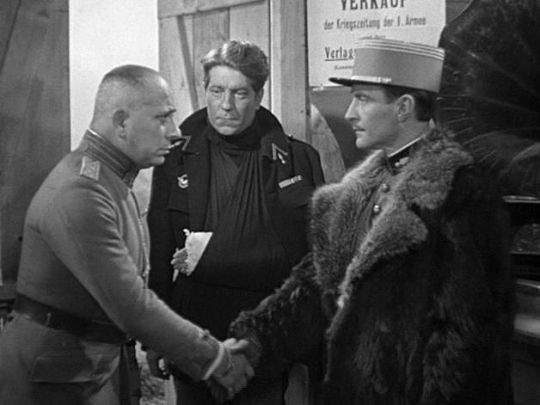
It’s not then a movie about a prison escape. It dwells on the conflicts among men. The prison camps show the entire national community in a bubble. Ideas such as nationalism, class, and race create the conflict between the prisoners; however, at the same time, they bring people together.
It’s also a meditation on the collapse of the old order of European civilisation. Perhaps that was always a sentimental upper class illusion, the notion that gentlemen on both sides of the lines subscribed to the same honourable code of behaviour. Whatever it was, it died in the trenches of World War One. The idea that wars can be fought according to gentlemanly rules is an illusion – like the belief that the 1914-1918 conflict was the war to end all wars. As Plato said at the beginning of the birth pangs of European civlisation, ‘only the dead have seen the end of war’.
91 notes
·
View notes
Photo

Jean-Pierre Martinet
0 notes
Link
Entrada dedicada a la editorial Underwood.
#'dime lo leído' - editoriales#boxeo#Brooklyn#California#Ce Santiago (trad.)#Fernando Peña#Gilbert Sorrentino#Gran Depresión#Jean-Pierre Martinet#Leonard Gardner#literatura estadounidense#literatura europea#literatura francesa#literatura norteamericana#Nueva Jersey#Radio 5#Rubén Martín Giráldez (trad.)#Rudolph Wurlitzer#Stockton#Underwood (ed.)#William Faulkner#libros#libros recomendados
0 notes
Text
“Certains voyaient, dans la mystérieuse réapparition de l'hiver, un présage : l'ancien monde n'allait pas tarder à s'écrouler. Le recul du printemps n'était que provisoire : la belle saison reviendrait, et, cette fois, elle s'installerait pour toujours. Je me moquais bien de toutes ces élucubrations. Seule comptait Paulina Semilionova et le désir fou que j'éprouvais de la voir morte. Tout entière à moi enfin. Peut-être alors ma douleur s'apaiserait-elle. Car c'est bien là que réside le caractère atroce de l'amour : l'objet aimé est toujours de trop, le bonheur suprême est de le faire disparaître. La passion est obscène. Elle ne se nourrit que d'absence et de mort. Alors un certain calme s'installe. Le cœur peut de nouveau battre à un rythme à peu près normal. La passion veut régner sans partage. Ce n'est pas la tendresse qui lui importe, mais le pouvoir. Les enfants, les fous, les rois, le savent bien, eux qui méprisent la réalité : on ne règne que sur des déserts, et quand la nuit est tombée. Que le monde courût à sa perte, que la révolution fût proche ou lointaine, cela m'était bien égal, ce qui était intolérable, c'était que cette petite traînée de Polly fût encore en vie, lumineuse parmi les hommes, déshabillée par eux, baisée par eux, même en imagination, tiède et vibrante, caressée, lépiotée, charnotée par mille bouches invisibles, vampires contre lesquels je ne pouvais pas lutter, et qui, pourtant, se nourrissaient de mon propre sang. Car entre Paulina et moi, il n'y avait aucune différence, enfin, je voulais dire, bientôt, il n'y en aurait plus. Son corps faisait obstacle. Il y avait bien trop longtemps qu'elle s'exhibait boulevard Hedvigue, à Darovima, et devant le collège Semivolsky, et un peu partout dans Paris.”
Jean-Pierre Martinet / Jérôme / Finitude / [1978] 2018.
4 notes
·
View notes
Text
HOMMAGE

© picmonkey
Le 12 octobre, à partir de 20 h 30, au cinéma Utopia, une soirée consacrée à l’auteur de Jérôme (publié chez Finitude) avec la diffusion du documentaire Le Noir Roman de Jean-Pierre Martinet de Nils Warolin. Après la projection, lecture d’extraits, puis débat avec Éric Dussert (préfacier, responsable de collection), Thierry Boizet (des éditions Finitude), et le duo Nicolas Étienne et David Vincent de la maison de l’Arbre vengeur qui a notamment édité La Grande Vie dans la collection L’Alambic. Histoire de se souvenir de la figure singulière de cette plume libournaise.
Le Noir Roman de Jean-Pierre Martinet, jeudi 12 octobre, 20 h 30, Utopia. www.cinemas-utopia.org/bordeaux
0 notes
Photo

"El olor acre de la orina de los perros me hacía llorar los ojos. Me acordaba a menudo de aquel cineasta japonés, Ozu, que hizo grabar esta sencilla palabra en su lápida: "Nada". También yo me paseaba con un epitafio similar, sólo que en vida. Caía en el vacío del tiempo, y nada ni nadie podía retenerme. El mundo, a mis oídos, no era más que una música fúnebre."⠀ ⠀ "The acrid smell of dogs' urine made my eyes cry. I often remembered that Japanese filmmaker, Ozu, who had this simple word engraved on his tombstone: "Nothing." I also walked with a similar epitaph, only in life. I fell in the emptiness of time, and nothing and nobody could hold me back. The world, in my ears, was nothing more than a funeral music."⠀ ⠀ Jean-Pierre Martinet⠀ Vidorra⠀ & Adrian Ghenie (artist)⠀ ⠀ #art #portrait #portraitart #portraitpainting #portraiture #oilpaint #oilpainting #oiloncanvas #painting #contemporary #contemporaryart #contemporaryartist #contemporarypainting #newcontemporary #modernart #modernpainting #artgallery #contemporaryartgallery #visualart #visualartist #figurative #figurativeart #figurativepainting #artcollector #undergroundart #abstractart #abstractpainting #abstractportrait #marcopolorules #adrianghenie https://www.instagram.com/p/BweH3SrB1SF/?utm_source=ig_tumblr_share&igshid=16vc0nboctfbh
#art#portrait#portraitart#portraitpainting#portraiture#oilpaint#oilpainting#oiloncanvas#painting#contemporary#contemporaryart#contemporaryartist#contemporarypainting#newcontemporary#modernart#modernpainting#artgallery#contemporaryartgallery#visualart#visualartist#figurative#figurativeart#figurativepainting#artcollector#undergroundart#abstractart#abstractpainting#abstractportrait#marcopolorules#adrianghenie
3 notes
·
View notes